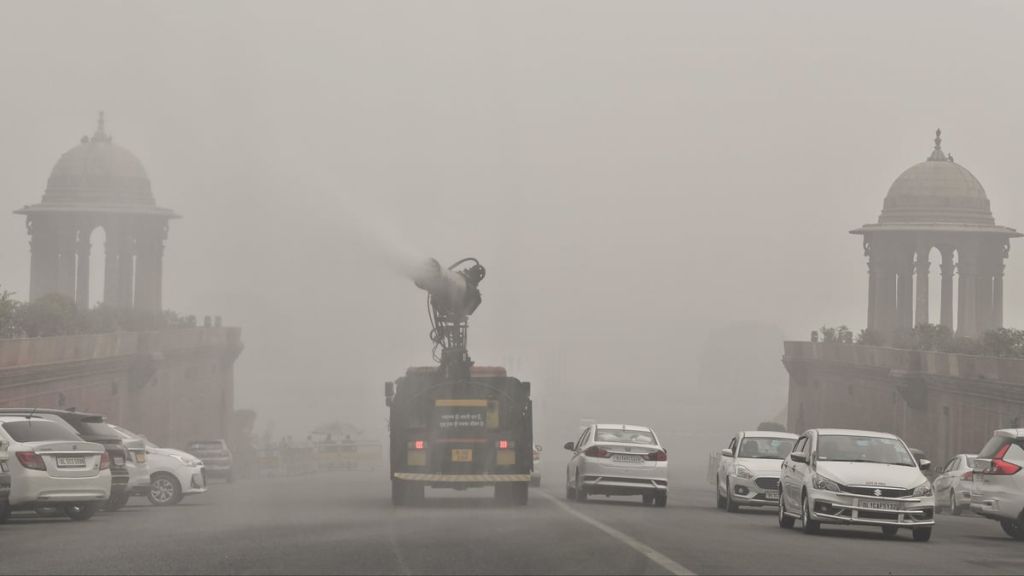
Pollution levels in Delhi have reached dangerous levels, prompting the government to enforce Stage 4 measures of GRAP. On Tuesday morning, the country's capital city experienced a 'severe' Air Quality Index (AQI), with Anand Vihar registering an alarming AQI of 500 by 6 am.
As per official statistics, 20 monitoring stations throughout the city detected AQI levels hitting the highest 500 mark by Monday evening. Furthermore, due to the GRAP Stage 4 restrictions, construction work on the metro in Saket has been stopped.
Delhi's air quality remains 'severe plus' for second consecutive day, smog shrouds city reducing visibility
— ANI Digital (@ani_digital) November 19, 2024
Read @ANI story | https://t.co/qJFw6ply7Z#Delhi #AQI #smog #airpollution pic.twitter.com/Gae1UcNSZi
The India Meteorological Department (IMD) states that the weather forecast for today anticipates thick fog in the morning, which is likely to persist into the forenoon with moderate to dense visibility.
Throughout the day, the sky will mostly stay clear, but there could be some shallow to moderate fog in the afternoon and evening. During the nighttime, there is a high chance of moderate fog formation once more. IMD has also given out an orange alert today due to dense fog.
Supreme Court questions authorities why there was a delay of 3 days in imposing GRAP-3 in Delhi NCR.
— ANI (@ANI) November 18, 2024
Supreme Court says it is proposing to pass an order that authorities will not go below GRAP stage 4 without court’s permission even if Air Quality Index (AQI) goes below 300.… pic.twitter.com/Hnrx0RsP5V
The Supreme Court of India has issued a directive ordering the closure of schools in Delhi and the National Capital Region due to severe air pollution. The court has mandated the implementation of stringent anti-pollution measures under the Graded Response Action Plan Stage IV.
This intervention highlights the urgency of the crisis, emphasising the threat to public health from toxic air, especially for vulnerable groups like children and the elderly. The court's ruling requires all NCR governments to enforce Stage IV measures immediately, regardless of AQI levels dropping below 450.
The Commission for Air Quality Management was criticised for delayed action, with the court insisting on immediate implementation of protocols when AQI reaches severe levels. The court has also instructed states and the central government to submit compliance affidavits detailing pollution control measures by November 22, 2024.
The court emphasised the importance of strict compliance with air quality measures to ensure a pollution-free environment and protect the health of NCR residents.
With imposition of GRAP-4, physical classes suspended for all except class 10, 12, announces Delhi CM
— ANI Digital (@ani_digital) November 17, 2024
Read @ANI Story | https://t.co/REmRprBjHE#Delhi #CMAtishi #GRAPIV pic.twitter.com/xuaP9DNYNB
In response to severe pollution levels and low visibility in Delhi, Chief Minister Atishi announced the closure of all schools for physical classes. Only students in Classes 10 and 12, preparing for board exams, are allowed to attend physical classes, while all other grades have transitioned to online learning indefinitely.
The move aims to protect students, who are particularly vulnerable to the harmful effects of toxic air. In neighbouring regions, Haryana has granted holidays for primary school students up to Class 5, with authorities able to extend holidays or switch to online classes based on Air Quality Index (AQI) conditions.
Punjab is monitoring the situation closely and may consider temporary closures due to unhealthy AQI levels. In Uttar Pradesh, areas like Ghaziabad, Noida, and Meerut are experiencing severe pollution, but no decisions on school closures or online classes have been made yet, with discussions ongoing at the local level.